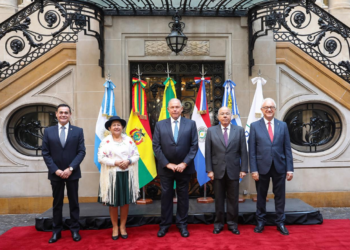Ambassador receives diplomats and representatives from the Brazilian government for celebration of the National Day
Fotos: Rafael Luz
The anniversary of the independence of the Republic of Chile, realized in the last Wednesday 21, gathered in the embassy of Chile in Brasília, representatives from the Brazilian government and of the diplomatic corps, for the civic event. The musical band of the president of the Republic of Brazil, the Independence Dragons, made the official opening of the event playing the national anthem of Brazil and Chile. The event happened at the garden of the embassy in a relaxed and welcoming environment.



History of Chile – Like Brazil, Chile also had the colonization period. In service of the king of Spain, the Portuguese navigator Ferdinand Magellan was the first European to visit the country and landed on the island of Chiloé in 1520. But it was Pedro de Valdivia, sent by Charles V, who established several colonies, among them Santiago de la Nueva Extremadura (1541), Concepcion (1550) and Valdivia (1552).
The Mapuche, the largest indigenous tribe in Chile, bravely resisted the Spanish colonization, making room for the Church, which in collaboration with the real power played an important role in the organization of colonial society in which they established churches, schools and started the first business activities, as farms run by the Jesuits. In this period, there was no great development, because Spain has not leveraged the manufacturing industry and there is no space in Chile for marketing of European products. This made Chile’s economy return to the crop (wheat field) and livestock (cattle breeding) and its derivatives. Only in the late eighteenth century that Chile was allowed to mint its own currency, the Chilean peso.
Call of the Kingdom of Chile, between 1810 and 1818, led by Bernardo O’Higgins through armed struggle, the Chilean independence movement gave the colony the right to secede from Spain, and formed an independent government. Ahead of the rest of Latin America, the nation entered an era of relative political stability – a very different situation from neighboring countries at the time – from 1831, two wars against Peru and Bolivia gave it the conquest of ore region saltpeter, which represented at that time about 80% of exports. After parliamentarism (1891-1925), Chile adopted the presidential system, which lasts to the present day, with the democratic government.
Democracy – The Chilean political history had various contexts over the years. Colony, democratic republic; there was a military coup. The victory of Patricio Aylwin, followed by the reopening of the National Congress; the new president faced some difficulties in his government. In 1993 there were new presidential elections that led Eduardo Frei Ruiz-Tagle to power in 1994. Today Chile has the presidency of Michelle Bachelet, elected in 2014.
Chile celebra data nacional em Brasília
Embaixador recebe diplomatas e representantes do governo brasileiro em embaixada
Oda Paula Fernandes
O aniversário da independência da República do Chile, realizado na noite desta última quarta-feira 21, reuniu na embaixada do Chile em Brasília representantes do governo brasileiro e de corpo diplomático, para evento cívico. A banda de música da presidência da República do Brasil, os Dragões da Independência, fez abertura oficial do evento ao tocar os hinos do Brasil e do Chile. O evento aconteceu no jardim da embaixada em ambiente descontraído e acolhedor.
Em discurso, o embaixador do Chile no Brasil, Jaime Gazmuri, cumprimentou o ministro interino das relações exteriores do Brasil, senadores, reitor universitário, deputados, almirantes, embaixadores, amigos e convidados presentes e ressaltou a força do poder democrático do país. “Esta é a maior festa cívica celebrada no Chile, pois nossa independência foi conquistada com muita luta”, ressalta o embaixador.
Para o Presidente do Brasil em exercício, Rodrigo Maia, Brasil e Chile são parceiros estratégicos. “A relação entre ambos países se fundamentam não apenas na circunstância Sul-Americana, mas também sobre valores comuns que compartilhamos como o compromisso inabalável com a democracia e diretos humanos, o crescimento econômico acompanhado de inclusão social para nossos países e para toda região e a promoção de uma ordem internacional mais justa e representativa”, afirma Maia.
“No mundo, pensando em prazo mais longo, talvez seja sempre melhor nós vivermos não movidos pelos ciclos naturais de otimismos e pessimismos, mas sim pela convicção permanente dos valores, nas possibilidades e com a determinação de avançarmos. A convicção que o Brasil tem na força da democracia, na integração Latino-americana e na integração de nossos povos e a determinação que temos em trabalharmos juntos pela melhora de vida de nossas populações, fortalecem essa relação cada vez mais intensa entre Brasil e Chile”, lembra Maia.
História do Chile- Assim como o Brasil, o Chile também teve o período de colonização. Em serviço do rei da Espanha, o navegador português Fernão de Magalhães foi o primeiro europeu a visitar o país e desembarcou na ilha de Chiloé em 1520. Mas foi Pedro de Valdivia, enviado por Carlos V, quem estabeleceu várias colônias, entre elas, Santiago de la Nueva Extremadura (1541), Concepción (1550) e Valdivia (1552).
Os mapuches, maior tribo indígena do Chile, resistiu bravamente à colonização espanhola, abrindo espaço para a Igreja, que em colaboração com o poder real teve um importante papel na organização da sociedade colonial a qual criaram igrejas, escolas e começavam as primeiras atividades empresariais, como fazendas administradas pelos Jesuítas. Neste período, não houve grande desenvolvimento, pois a Espanha não alavancou a indústria de manufaturados e não via no Chile espaço para comercialização dos produtos europeus. Isso fez com que a economia do Chile se voltasse para a lavoura (plantação de trigo) e pecuária (criação do gado) e seus derivados. Apenas no final do século XVIII ao Chile foi permitido cunhar sua própria moeda, o peso chileno.
Chamada de Reino do Chile, entre 1810 e 1818, liderada por Bernardo O’Higgins através de luta armada, o movimento de independência do Chile deu à colônia o direito de separar-se da Espanha, e formou um Governo Independente. À frente dos demais países da América Latina a nação entrou numa era de relativa estabilidade política – situação bem diferente dos países vizinhos na ocasião – a partir de 1831, duas guerras contra o Peru e a Bolívia que lhe conferiram a conquista da região de minério e do salitre, que representava naquela época cerca de 80% das exportações. Após o parlamentarismo (1891-1925), o Chile adotou o presidencialismo, que dura até os dias atuais, com governo democrático.
Redemocratização – A história política do Chile teve vários contextos ao longo dos anos. Da colônia à república democrática houve golpe militar. A vitória de Patricio Aylwin, seguiu pela reabertura do Congresso Nacional e o novo presidente enfrentou algumas dificuldades em seu Governo. Em 1993 houve novas eleições presidenciais que levaram Eduardo Frei Ruiz-Tagle ao Poder em 1994. Atualmente o Chile tem a presidência Michelle Bachelet, eleita em 2014.

























